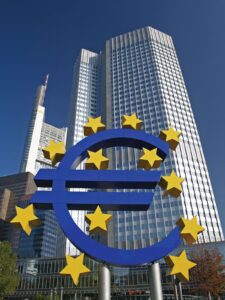
The European Bank for Reconstruction and Development (EBRD) invested EUR1 billion in the Ukrainian economy in 2021, bringing its three-year investment in the country to EUR3 billion.
“True to its ambition to become a majority green bank by 2025, some 45% of bank financing in Ukraine was in support of greater sustainability and energy and resource efficiency. Examples included a EUR140 million EBRD loan to modernize district heating and hot water supply in the capital, Kyiv, and a EUR50 million loan for Kyiv to renew the rolling stock of its metro network and support the shift from private cars to modern, efficient and environmentally friendly public transport,” the bank said.
“The bank also attracted a EUR5.5 million grant from the E5P to complement an earlier EUR25 million loan to refurbish, for greater energy efficiency, about 100 public buildings in Dnipro. Dnipro and Ukraine’s second-largest city of Kharkiv decided to accelerate their investment in green solutions by joining EBRD Green Cities, a flagship urban sustainability program, following in the footsteps of Lviv, Kyiv, Mariupol, Khmelnytsky and Kryvy Rih. Ukraine has more cities taking part in the program than any other economy in which the EBRD invests,” the report says.
“In the private sector, the bank teamed up with Kernel Group to help strengthen the company’s climate corporate governance. It is also supported the development of low-emission sustainable property by backing the real-estate portfolio of Dragon Capital, an investment firm,” according to the document.
“The bank joined forces with the European Union in extending grants to innovative Ukrainian firms seeking to improve climate resilience. The beneficiaries included a producer of recycled plastic The Good Plastic Company, architecture studio Ekodar, yeast producer Enzym, engineering firm Dominion, water and rainwater management company Viva Victoria and The Laboratory of Advanced Jet Propulsion, an institution focused on rocket and spacecraft technologies,” it says.
“The EBRD’s efforts to advance the sustainability of Ukraine’s economy were encouraged by the country’s newly reviewed Nationally Determined Contribution. The EBRD helped to develop the policy document and stands ready to help set out a low-carbon and climate-resilient pathway for the power generation sector in Ukraine,” the bank noted.
“In addition, the EBRD invested $ 75 million in a $825 million eurobond placed by Ukrenergo, the state-owned electricity transmission system operator, in a bid to resolve the payments crisis gripping the country’s renewable energy sector. The first ever sustainability-linked bond issued by a Ukrainian company, it helped restore the credibility of the Ukrainian renewable energy sector, paving the way for much-needed investment to support the country’s green transition. In the infrastructure sector, the EBRD approved a new EUR190 million loan tranche for further improvements to the country’s roads. This follows efforts by Ukravtodor and the Ukrainian authorities to implement a comprehensive anti-corruption program,” it says.
“This is part of the EBRD’s broader work to promote corporate governance reform in state-owned enterprises and to strengthen their supervisory boards. In a further move to promote greater private-sector participation in the development of infrastructure, the bank joined forces with the International Finance Corporation (IFC) on a new advisory engagement with the Ministry of Infrastructure to help structure private-public partnerships in the road sector and to prepare the concession of selected terminals at Chornomorsk port,” it reads.
“Standing by its long-time partner, the city of Lviv, the bank provided emergency funds to ensure that the vital infrastructure is safe and functioning during the ongoing pandemic. As social distancing measures remained in place, the EBRD supported companies that facilitated remote entrepreneurship and helped people to stay in touch, such as state-owned postal service Ukrposhta and its privately owned peer, Nova Poshta, as well as Datagroup, a provider of fibre infrastructure and digital services,” the report states.
“Recognizing the importance of better access to credit and trade finance, the EBRD channeled EUR357 million to seven local lenders: Ukrgasbank, Raiffeisen Bank Ukraine, Ukreximbank, OTP Bank, ProCredit Bank, Credit Agricole and Bank Lviv. Backed by EU investment incentives, the bank increased lending for small and medium-sized enterprises via partner banks under the EU4Business-EBRD credit line,” it reads.
“It also delivered record volumes of trade finance as part of the Trade Facilitation Program. Furthermore, the bank financed successful Ukrainian companies such as car importer Winner, Kokhavynska Paper Factory and gas trader ERU Trading. It also teamed up with USAID and the American Chamber of Commerce to develop an action plan for the consolidation of infrastructure for the capital and commodities markets,” according to the bank.